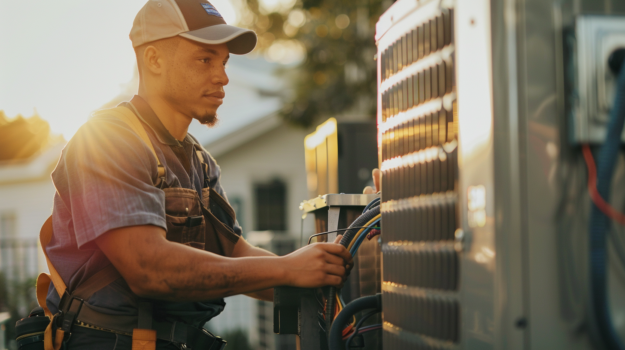One of the most common issues homeowners face with their HVAC system is discovering that the air handler is leaking water. This can be alarming, but it’s important to understand that in most cases, this is not a sign of catastrophic failure. Instead, it often stems from issues related to condensation. Your air handler plays a key role in the heating and cooling of your home, particularly in removing moisture from the air. When everything is working as it should, this moisture is condensed into water, which is then funneled through a drain line. However, when something goes wrong, that water can leak out.
Leaking water is generally a sign that your system’s condensate drain line is clogged, or your drain pan is damaged. The condensate drain line is designed to remove moisture from your system, but if it becomes blocked by dirt or debris, the water has nowhere to go, causing it to leak. Similarly, if the drain pan is cracked or damaged, it won’t be able to catch the water, leading to leaks. Another possibility is that the evaporator coil is freezing up, often due to airflow restrictions or low refrigerant levels, causing water to overflow when it thaws.
It’s important to address these issues promptly. While a small leak may not seem like a big deal, it can lead to more significant problems like mold growth, water damage to your home, and reduced efficiency in your HVAC system. If you notice that your air handler is leaking, it’s often a good idea to contact a professional, especially if you suspect a clogged condensate line or frozen evaporator coil. Homeowners in Atlanta, GA HVAC can easily find professional help, as local specialists are well-versed in diagnosing and fixing these types of HVAC issues.
Air Handler Maintenance Tips for Every Season
Keeping your air handler in good working condition doesn’t require extensive technical knowledge. With just a few simple maintenance tasks, you can ensure that your HVAC system runs efficiently all year long. Whether it’s the sweltering heat of summer or the chill of winter, your air handler needs regular care to perform at its best.
The first tip is to regularly change your air filter. Dirty filters restrict airflow, causing your system to work harder than it needs to. Replacing the filter every one to three months can significantly improve efficiency and air quality. In addition to replacing the filter, it’s essential to check the drain pan and drain lines regularly. A clogged drain line can lead to leaks, as mentioned earlier, so making sure that it’s clear of debris can prevent water damage and system malfunctions.
Another important seasonal tip is to clean your evaporator coil. Dust and dirt can build up on the coil over time, which reduces the system’s ability to absorb heat. Keeping the coil clean ensures that your air handler can cool your home effectively during the hotter months. If your system includes a Daikin ducted mini split, it’s especially crucial to keep these components clean, as the efficiency of ductless systems heavily depends on proper airflow and maintenance.
During winter, it’s a good idea to ensure that your air handler’s heat exchanger is in good condition, especially if you’re using a heat pump system. For homes and businesses that utilize commercial HVAC systems, maintenance is even more critical, as any downtime during extreme weather can lead to significant disruptions.
Lastly, make sure you schedule professional inspections at least once a year. This is particularly important for businesses using commercial HVAC wholesale systems, as regular maintenance can extend the life of the unit and prevent costly repairs. Residential units also benefit from these inspections, as HVAC professionals can spot problems early before they escalate into expensive fixes.
Common Issues with Air Handlers and How to Spot Them
Air handlers are robust and reliable, but like any mechanical system, they can encounter issues from time to time. Being able to recognize these problems early can save you from dealing with more significant repairs or, in some cases, a complete system replacement. One of the most common issues homeowners experience with their air handler is weak airflow. If the airflow from your vents seems reduced, this could be a sign of a clogged air filter, which restricts the system’s ability to circulate air. Another potential cause of weak airflow could be an issue with the blower motor. If the motor is malfunctioning or worn out, the system may struggle to distribute air effectively.
Strange noises coming from the air handler are another telltale sign of a problem. Rattling or banging sounds could indicate loose parts, while a squealing sound might suggest an issue with the motor or fan belt. These noises should never be ignored, as they often point to a mechanical issue that could lead to further damage if not addressed promptly.
An air handler that cycles on and off frequently, also known as short cycling, is another common issue. Short cycling could indicate that the system is too large for the space it’s cooling or that there’s a problem with the thermostat. It may also be a sign of low refrigerant levels, which can cause the system to work harder to cool your home, leading to premature wear and tear.
For businesses using commercial HVAC supplier systems, regular monitoring is crucial, as any malfunction in a commercial setting can affect comfort levels for both employees and customers. Fortunately, commercial HVAC specialists can quickly diagnose and repair issues like short cycling and weak airflow, ensuring minimal disruption to business operations.
Homeowners should also be aware of issues like excessive moisture or water leaks, which, as previously mentioned, could indicate a clogged drain line or a frozen evaporator coil. If you notice these issues, it’s best to contact an HVAC professional. Local experts in Atlanta GA HVAC are experienced in troubleshooting common air handler problems and can provide quick, effective repairs.
Keeping Your Air Handler Running Smoothly
Maintaining the efficiency and longevity of your air handler doesn’t have to be complicated. By following a few practical tips, you can keep your system running smoothly year-round. One of the simplest ways to maintain your air handler is to make sure that it’s clean. Dust and debris can accumulate on the system’s internal components, reducing efficiency and leading to more frequent breakdowns. Regularly dusting the outside of the unit and ensuring that the area around it is free from clutter can go a long way in preventing these issues.
Additionally, keeping the air filter clean is crucial for smooth operation. A dirty filter can lead to restricted airflow, which forces the system to work harder. Replacing the filter every few months is an easy task that can significantly improve your air handler’s efficiency.
Another important tip is to pay attention to your thermostat settings. Make sure that your thermostat is correctly calibrated and placed in a location that accurately reflects the temperature of your home or business. This ensures that your air handler isn’t working harder than it needs to maintain your desired temperature.
For those using Daikin 2 zone mini split systems, ensuring that both zones are calibrated and set correctly can make a big difference in overall efficiency. Similarly, if you have a larger system like a Daikin 5 zone mini split, balancing the cooling load between different zones can extend the life of your system and lower energy costs.
Finally, scheduling regular maintenance is one of the best ways to keep your air handler in top condition. Whether you have a residential HVAC system or a commercial HVAC setup, routine inspections and tune-ups will catch potential problems early, ensuring smooth operation for years to come.
Air Handler Lifespan: How Long Do They Really Last?
The lifespan of an air handler can vary depending on several factors, including how well it’s maintained and the quality of the unit itself. On average, a residential air handler lasts between 10 and 15 years, though some well-maintained systems can last even longer. For commercial HVAC systems, the lifespan may be slightly shorter due to the higher demand placed on the unit, but regular maintenance can help extend it.
One of the most significant factors affecting an air handler’s lifespan is how often it’s used. Systems that are constantly running, especially in extreme climates, will experience more wear and tear than those that are used less frequently. However, even in areas where the system is used regularly, like in Atlanta GA HVAC environments, routine maintenance can help mitigate the impact of heavy usage. Replacing worn-out components, such as the blower motor or evaporator coil, can also extend the life of the system and prevent the need for a full replacement.
Another factor that plays a role in the lifespan of an air handler is the quality of the unit itself. Brands like Daikin are known for their reliability and durability. Investing in a high-quality unit, such as a Daikin 9000 BTU mini split or a Daikin 36000 BTU mini split, ensures that you get the most out of your system, both in terms of performance and longevity.
For those looking to maximize the lifespan of their air handler, it’s essential to follow a consistent maintenance routine, address problems as soon as they arise, and invest in high-quality equipment. Whether you’re a homeowner or a business owner managing a commercial HVAC system, taking these steps will help you get the most out of your air handler.
Conclusion:
Keeping your air handler in good condition is key to ensuring a comfortable and energy-efficient home or business. Regular maintenance, prompt repairs, and investing in quality systems like Daikin mini splits can extend the lifespan of your air handler and keep it running smoothly for years to come. Whether you’re dealing with a leak, noticing weak airflow, or simply want to improve your system’s efficiency, taking proactive steps can prevent costly breakdowns and ensure that your HVAC system remains in top shape.








